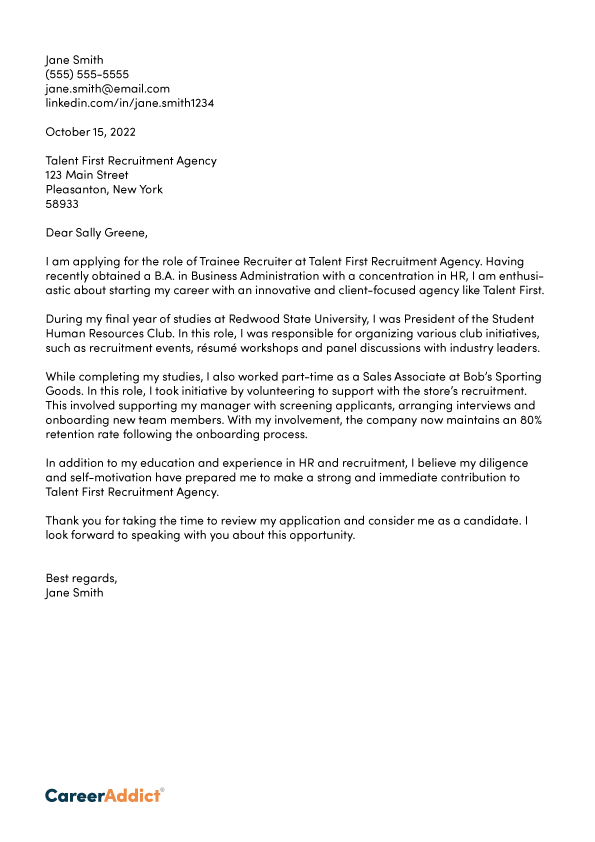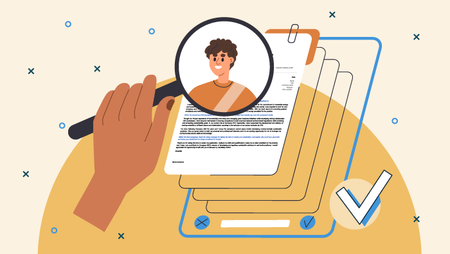Writing a cover letter can be a challenge for jobseekers at any stage in their career. But if you’re just starting out your first job search and haven’t yet acquired work experience, it can be particularly challenging.
However, even without prior work experience, you most likely still have many other skills, attributes and experiences that are relevant for the role. And in order to impress the employer and land your first job, you’ll need to demonstrate this in your cover letter and your first résumé.
If you want to discover how to write an impactful entry-level cover letter, despite having no work experience, this guide is for you.
What to include
Your résumé and cover letter are essentially the first impression that the employer will have of you. Therefore, you’ll want to take your time on the application documents and ensure the format is easy to read and that all necessary information is included.
Fortunately for those new to writing cover letters, there is a standard format that is applicable for most types of cover letters. Below is more detail on each element that should be included in your cover letter:
- Contact details: Your name, phone number, email address and links to your professional social media pages should be at the top.
- Company details: Under the header should be the name of the hiring manager or recruiter along with the address of the company.
- Introductory paragraph: The introductory paragraph should quickly grab the reader’s attention and demonstrate that you are a suitable candidate.
- Body paragraph: The body paragraph is to explain, in detail, why you are a good candidate for the role.
- Closing paragraph: In the closing paragraph, you should thank the employer and show your anticipation for the next steps.
- Closing salutation: The last part of the cover letter is a short salutation, such as “Sincerely" or “Kind regards,” followed by your name.
Tips for writing a cover letter with no experience
When writing a cover letter with no experience, you’ll need to take a different approach than if you were a more experienced applicant. However, this doesn’t mean that you can’t still impress the employer. In fact, some employers may seek applicants with less experience, as they could be easier to “mold.”
However, even if many employers are open to hiring candidates without work experience, you’ll still need to show that you have the skills and attributes to be successful and develop in the role. Below are 10 tips to help you win over the employer when writing a cover letter with no experience.
1. Do your research
Before beginning to write your cover letter, it’s vital to do some research on the company. While you hopefully already studied the job description, this is usually not enough to be able to write a tailored cover letter. After all, the goal is to really hone in on how you’re a great fit. And in order to do this, you’ll need more information on what would make a candidate suitable.
Reading through the company website and social media channels will give you a better idea of the company’s culture and values. This way, you can tailor your cover letter to highlight skills, attributes and experiences that are aligned with what they value as an employer.
2. Start strongly
First impressions matter — even for cover letters. Therefore, starting your cover letter strongly is crucial to making a good first impression and ensuring the employer keeps reading. However, when it comes to the opening of your cover letter, balance is key. Cajolery, or being overly bold or frivolous, usually doesn’t come off well in cover letters.
While employers want to see some personality, it’s important to remain authentic and serious. Conveying enthusiasm and passion or sharing an accomplishment are great ways to open a cover letter strongly. If you have a reference in the company, mentioning them in the opening is another effective way to get the reader’s attention.
3. Convey enthusiasm
Employers like to hire candidates that are excited about the job because this usually means that they will become engaged and motivated employees. Therefore, it’s important to show your enthusiasm for the job throughout your cover letter and make sure it is tailored to the specific role.
Nothing indicates a candidate's lack of motivation more than a cover letter that isn’t tailored for the job. So, make sure to point out a few aspects of the company or role that specifically interest you. This shows you not only did your research, but also that you really want this specific role.
4. Emphasize transferable skills
Cover letters often include achievements and skills obtained from work experience. However, for career starters who don’t yet have work experience, this doesn’t mean they don’t have other types of relevant experience. So, make sure to emphasize transferable skills obtained from volunteering, internships, education or extracurricular activities.
For example, if you were the captain of your sports team in college, this shows leadership and teamwork. You could also highlight any coursework or university projects that are directly relevant to the role. Even if certain experiences don’t seem relevant at first, they could have actually provided you with transferable skills that could help you in job.
5. Share achievements
One of the best ways to show the employer that you would be an asset to the company is by sharing your past achievements. Through including your past achievements in your cover letter, you demonstrate to the employer that you are motivated, capable and achievement oriented.
Even if you don’t have work experience, you could still highlight achievements that are relevant to the role. For example, if you graduated university with good marks, this is worthy of sharing. Other examples of achievements are successful university projects, formal recognition at a part-time job, or obtaining any extracurricular leadership positions.
6. Quantify your cover letter
Quantifying achievements and other key information in your cover letter is a great way to impress the employer and grab the reader’s attention. This not only emphasizes your value, but also describes the impact in more relatable and less vague terms.
For example, instead of writing, “While President of the Accounting Club, I increased club membership,” you could write, “While President of the Accounting Club, I increased club membership by 10%.” Quantifying your achievement is more effective and memorable for the reader.
7. Use keywords from the job description
Using specific keywords from the job description is an effective strategy to enable recruiters to easily determine that your skills and qualifications match the job. Since recruiters oftentimes screen many cover letters, they may be on the lookout for certain keywords.
Using keywords from the job description is particularly important when you are applying for jobs without experience. Since you can’t demonstrate to recruiters you have experience actually doing the job, you’ll want to show that you still have the skills and qualifications.
8. Consider tone of voice
Since different industries, fields and organizations have different communication styles and levels of formality, the tone of voice used for your cover letter should ideally match the company’s. For example, a cover letter for a graphic designer role at a startup would have a different tone of voice than a cover letter for a junior accountant at an investment firm.
The job description will usually include indicators as to the communication style of the company. Do they use colloquial words or more formal language? How do they describe the company culture? These will give you a better idea of the type of language and tone of voice you should be using in your cover letter.
9. Be succinct
A general rule of thumb is that cover letters should be no longer than one page, or 250–400 words. Since employers typically receive numerous applications, many simply don’t have the time to read anything longer. And for this reason, being succinct, to the point and impactful are key.
By thoroughly editing your cover letter, you can ensure brevity and conciseness. One effective way to edit is to go through each sentence and ask yourself if it serves a purpose. If not, then chances are that it is just filler information and could be cut out.
10. Don’t repeat your résumé
As the purpose of the cover letter is to supplement your résumé, you wouldn’t want to miss an opportunity to make an impression on the employer. Therefore, it’s important to make sure you aren’t making the mistake of just repeating the contents of your résumé in letter form.
In your cover letter, you should pull out the skills and experiences from your résumé that are most relevant to the job, and then elaborate on them. It may help to think of the cover letter as a sales pitch. You don’t need to include every skill and experience, but only the ones that demonstrate you are a fit for this specific role.
Example of a cover letter with no experience
Below is a sample of a cover letter for an applicant with no work experience, which you can use as a template to write your own cover letter.

Key takeaways
Every professional starts their career with no experience. Therefore, if you are seeking to obtain a job, internship or traineeship without prior work experience, it is by no means impossible.
However, it will require a different approach. So, when writing a cover letter with no experience, remember to:
- Emphasize any transferable skills you’ve obtained from internships, courses, or extracurricular activities.
- Share your achievements with quantitative examples to highlight the impact of your past successes.
- Use the cover letter to strengthen and supplement your résumé, not repeat it.
Through implementing the above tips and strategies, you can demonstrate to the employer that you’re a standout candidate — with or without experience.
What do you find the most difficult when it comes to writing a cover letter? Did you find this guide helpful? Let us know in the comments below!


